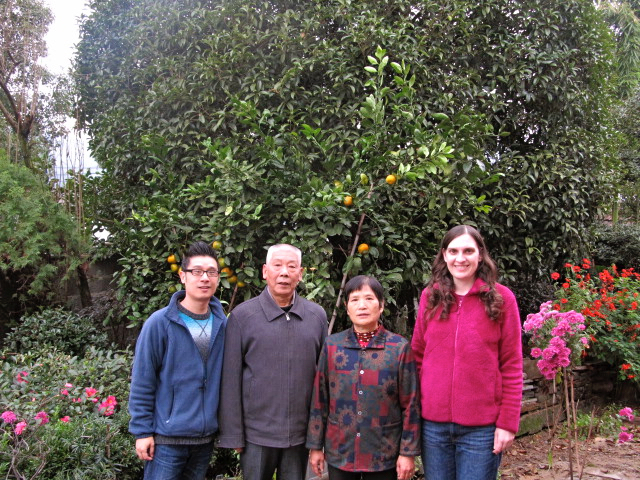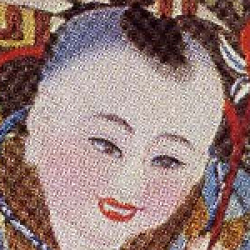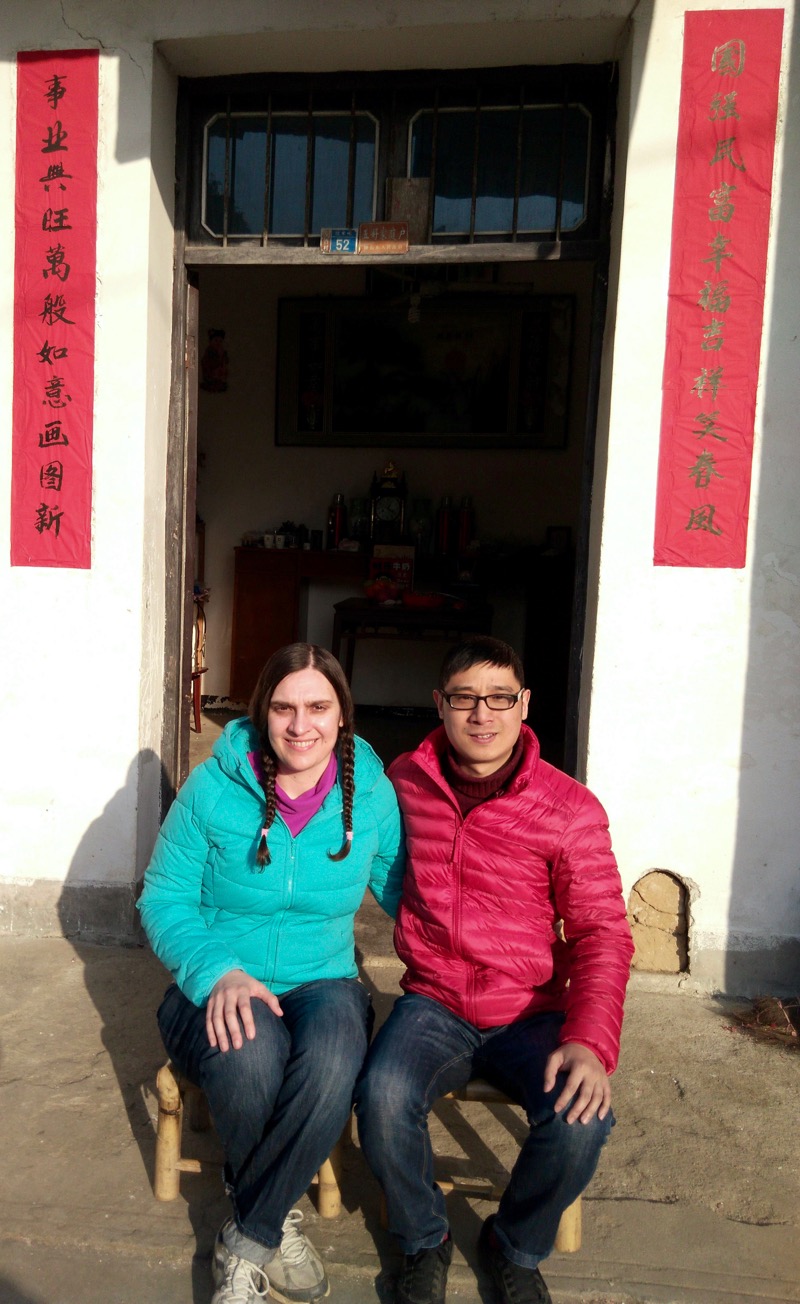 Ronaldo A. Coulter is the lawyer representing my husband Jun Yu in US Federal Court (learn more about the case here).
Ronaldo A. Coulter is the lawyer representing my husband Jun Yu in US Federal Court (learn more about the case here).
He also happens to follow my blog. And it’s interesting what he thought about China before he met me and my husband.
Here’s what he wrote to my husband earlier this summer in response to my post about being in the hospital in China:
…as a U.S. Marine raised in the Cold War era, I have always considered China and Russia the enemy. I have to admit that after working with you on this case and reading some posts on Jocelyn’s blog, I actually realize that just as in the United States there are everyday people in China.
Whether foreign relations will improve from where it is today is anyone’s guess. However, the pictures taken in the hospital on Jocelyn’s blog allow me to place a human element to my version of China.
Yes, he had considered China the enemy — until he started representing my husband and, later, reading my blog.
China as the enemy? It just sounds wrong to me. When you’ve lived in China for as long as I have – when you’re married to China, with family here – it’s impossible to think of this country as the enemy.
 This is the country that fostered my career as a writer. The country that taught me how to love and gave me an incredible husband. The country I plan to call home for the rest of my life.
This is the country that fostered my career as a writer. The country that taught me how to love and gave me an incredible husband. The country I plan to call home for the rest of my life.
China has given me so much, and continues to give more than I ever imagined. How could I feel anything but affection for this place? How could I possibly consider China the enemy?
Here’s the thing, though. I have to admit that it wasn’t always this way. Maybe my current self would never accept “China is the enemy” but my past self was different. There were moments in my past when I actually viewed China through skeptical eyes. And yes, there were even times when I thought of China in opposition to the United States.
US-China relations were tense when I first entered the Middle Kingdom back in August 1999. That was just months after the NATO bombing of the Chinese embassy in Belgrade, sparking widespread demonstrations in China.
I was so anxious at the time for reasons that had nothing to do with the political situation. After all, I was a total teach in China newbie. I knew only the basics of Chinese history and culture, and my language skills were limited to laughable “phrasebook Mandarin Chinese”. I had never taught anything in my life, yet I had committed myself to a year of training college students in English.
But when I saw the news reports of those demonstrations – which included protesters chucking rocks at US Embassies and Consulates – my worries suddenly went beyond the usual troubles of teaching English in a truly foreign country.
I wondered, would being an American in China suddenly turn me into a target? Should I start telling everyone I’m a Canadian? What in the heck did I get myself into?
But after arriving in Zhengzhou, China, it was nothing like I had imagined.
Students welcomed me with giant bouquets of flowers and invitations to dinners out.
Teachers helped me arrange lessons in Tai Chi and Mandarin, with one teacher buying me the conversational Chinese book that helped me finally find my groove in the language.
I easily fell into close friendships and later began dating a local man, my first truly adult relationship.
The love and appreciation that surrounded me made it impossible to imagine US-China tensions. If anything, in my little world in Zhengzhou, US-China relations were at an all-time high.
I’ll never forget that one final exam I delivered to my students in a classroom with a bulletin board about the NATO bombing in Belgrade.
The bulletin board stridently denounced the actions of Americans as barbaric and criminal. And, along with photographs of actual protests, the board urged patriotic students to demonstrate against this gross violation of China’s sovereign rights.
What a contrast to the students on those desks, who put on their warmest smiles afterwards and insisted we all take a class photo together. It was as if the final exam was merely an excuse for us to hang out one last time.
This was not a world where people angrily chucked rocks at me for the actions of my government. This was not a country where people outwardly hated me for my citizenship. From this side of the Pacific, China looked more like a friend and nothing like an enemy.
Over the years, I’ve dated several Chinese men – and ultimately, I married one. Jun Yu is the love of my life, the husband who truly completes me in every way that matters. Who would have thought I’d find him half a world away from my hometown of Cleveland, Ohio?
 Now that I’m intimately connected to this country, which is home to family too, it’s unthinkable to view China in the black-and-white terms people use in politics and the news. It just doesn’t fit my more nuanced perspective of this place. There’s so much we miss about a country if we only picture it through the eyes of the media.
Now that I’m intimately connected to this country, which is home to family too, it’s unthinkable to view China in the black-and-white terms people use in politics and the news. It just doesn’t fit my more nuanced perspective of this place. There’s so much we miss about a country if we only picture it through the eyes of the media.
Our lawyer Ron Coulter reminded me of the value that comes from writing about what it’s like to live with – and even sleep with – the so-called “enemy” country.
When we share stories of our daily lives across unlikely borders, we offer a chance to go beyond the headlines. To understand that there’s more to these places than what the reports suggest. To connect with the people and realize that, despite the cultural and linguistic differences, we have things in common too.
Maybe we really can change the world, one blog post (about a so-called “enemy” country) at a time.
All I know is, there’s one US Marine-turned-lawyer who will never see China the same again.
What do you think?


Beautiful post Jocelyn! From personal experience it can also be reversal, at least in terms of religion, where you don’t see different faith as an enemy, but when you grow up and meet people who are judgmental and who don’t want to be with you because you come from another faith, it is difficult to remain neutral towards that faith. Sad but true.
So glad you liked the post Sveta! And thank you for sharing your thoughts on how you’ve seen this play out with religion.
Jocelyn, I will share with your attorney what I learned from an exiled Tibetan Buddhist monk and my daughter’s Chinese family: the every day people of a country are not responsible for the actions of their government.
I know that there is a common belief that we have a democracy here in the U.S., but as Jimmy Carter pointed out, due to the Citizen’s United act, we no longer have a functioning democracy in this country, and we are in the same situation as folks in China and Russia.
I adopted my daughter without any knowledge of the fact that she had been taken from her family against their will. And when I found them and learned the truth, all I encountered was their gratitude to me for raising my daughter well, and an acknowledgement of a reality that they have lived with for a very long time: common, ordinary people are not responsible for the actions of their government.
I think one of the great things about the internet (and blogs like this one!) is that you can now learn what it is like in different countries from ordinary people who live there. I know the internet can be a platform for hate but it also connects the world like never before. Thanks for sharing Jocelyn 🙂
The internet is a font of misinformation and sometimes hate, but it’s also filled with blogs like yours about people in other countries. The more human stories we read, the more difficult it is to whip the populace into a nationalistic frenzy against another country.
Yay, interwebs. 🙂
Hi Jocelyn, what’s new? I know your dear husband actually has a ISU injustice, thought I can do nothing, I hope you win in this case.
For your story “China as enemy?”, I’d like to say people who have this opinion may probaly have no deep understangding of China. I have saw an interesting film called TATTOO, at the beginning the actress who teachs in a primary school indeed dislike the chief actor because he gave a disgussting (may be disgusting) TATTOO show on his body in her class. But at the very end of this film, guess what? They fall in love each other! That because, I think, the actress recognized TATTOO is a part of his life and the man treated it as art. Deep understanding of a certain thing makes a man changes his idea as time goes along.
Thanks for reading. And I have a question that you can give me help. It’s easy, I think, to understand when I changed the follwing sentence (Jocel) you wrote as:
“After all, I was a TOTAL NEWBIE teach in China.”
Jocel: “After all, I was a total************ teach in China newbie.”
Please remember all I say in this comment are just for Language itself. If I let you feel sick accidently, I will say sorry with humble current myself.
China as the enemy spills into Chinese American as the enemy although it might be plain racism….although this is just acting!
http://abcnews.go.com/US/recap-parents-disapprove-asian-fianc-dad-hits-sons/story?id=41652057
https://youtu.be/Kom9wMpLIzE
Well, same stuff on youtube. There is hope of attitude changing.
On more positive note, people might think about getting their degrees in China instead of West soon if following trend continue:
China Overtakes US in Scientific Articles, Robots, Supercomputers
http://www.unz.com/akarlin/sinotriumph/
Glory of Tang, Han empire might be back to China very soon.
Never posted before, but I’ve follow your website for a few years – since before I moved to China myself!
My experience has been that many Americans have out-of-date views on what China is like and are willing to make some pretty rash assumptions. My experiences have not always been easy in China, sure, but there are so many wonderful reasons to be there. Sharing stories and experiences is the best way to open others’ minds.
Hope you win your case~
I had no idea that people still considered China, as a whole, “the enemy”. It’s great to see that you and your husband have changed someone’s mind, and I’m sure your blog has had that effect on more people you don’t even know about. The best thing we can do as writers is share our experiences to help teach others and hopefully open their minds a bit 🙂